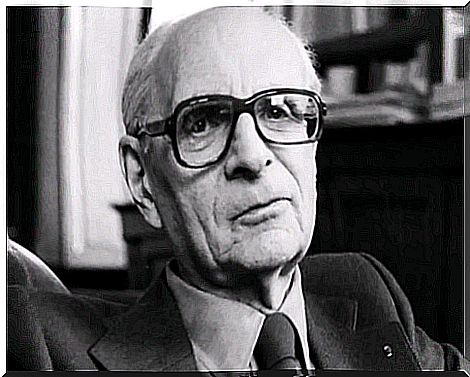An Extraordinary Anthropologist: Claude Lévi-Strauss

Claude Lévi-Strauss is the father of modern anthropology and one of the most excellent thinkers of the 20th century. He was the founder of structural anthropology, which changed the history of the discipline. This made him famous in the academic world.
Strange as it may seem, Calude Lévi-Strauss’s dream was actually interplanetary. He mentioned on several occasions that his greatest fantasy was that humans would colonize space and move to the moon or even Mars.
This man imagined people building new civilizations there and forgetting those who had been left on earth. He believed that those who remained would return to a wild state and that he could study them.
Françoise Héritier, his successor at the Collège de France, summed up his work by saying that he learned something basic about humanity. Cultures can sometimes be very different from each other.
With that said, Lévi-Strauss proved that the cognitive apparatus of humans is the same. As a result, differences and universality are both fundamental in humans.

Claude Lévi-Strauss’s beginning
Claude Lévi-Strauss was born in Brussels, Belgium on November 28, 1908, by accident. This was because his parents were French Jews traveling at this time.
His father was a portrait artist and his mother was a housewife. He was surrounded by a love of art, especially painting, music and poetry.
When World War I broke out, he moved to Versailles with his grandfather. His grandfather was a renowned rabbi. Claude Lévi-Strauss’ first contact with the synagogue was cold and rigid. As a result, he became indifferent to religion from an early age.
Instead, he became passionate about nature and showed great interest in collecting rare and whimsical cultural objects. He was also intellectually sharp, although he did not really stand out in his school years.
When he was a teenager, he returned to Paris, where his family lived, and joined a socialist organization.
From philosopher to ethnologist
Claude Lévi-Strauss first decided to study law. In 1927 , however, he changed his mind and changed his major in philosophy at the Sorbonne University.
There he met Jean-Paul Sartre and Simone de Beauvoir. He later acknowledged that philosophy both attracted and irritated him, as he felt there was too much vanity and speculation in the field.
When he finished his studies, he started working as a middle school teacher. However, he did not feel comfortable with his profession; he did not imagine that he would teach the rest of his working life.
Everything changed when he received a phone call from Célestin Bouglé, director of the École Normale Supérieure (a prestigious school) in Paris.
This moment marked a radical turn in his life. Bouglé asked him to travel to São Paulo on a mission for the university to become a professor of sociology.
He arrived there in 1935. In 1939 he began embarking on ethnographic expeditions to Mato Grosso and the Amazon. This experience marked the beginning of his most important work: structural anthropology.

A man who lived a century
After his experiences in Brazil, Claude Lévi-Strauss began to propose new ideas, new methods and greater reflections. He later spent some time in the United States fleeing Nazi persecution during World War II. He established valuable intellectual contacts there and continued to develop his theories.
One of the greatest milestones of his career was the publication of Tropical Elegy , which is widely recognized as one of the most important books of the 20th century. This book marked his path to academic fame. He also wrote Race and History , Myth and Meaning ( Myths and Meaning , not translated into Norwegian) and the series Mythologiques I-IV.
Many also say that he was a distant man who did not accept flattery. According to legend, he was not able to write without lyrical music.
He died in 2009 at the age of 100, after receiving a number of awards and recognitions during his lifetime. His work divided the study of history from the study of anthropology. Thanks to him, new research in anthropology has developed into what it is today.









